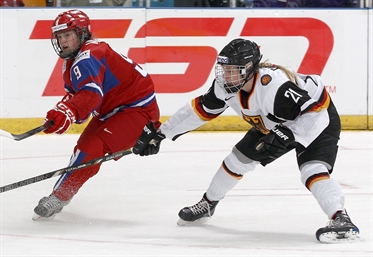Doing double duty
Doing double duty
PR rep Jenike also plays for German women’s team

 Both on and off the ice, Ronja Jenike (right, against Russia’s Alexandra Vafina) is making a big contribution to the German Ice Hockey Association. Photo: Jana Chytilova / HHOF-IIHF Images
Both on and off the ice, Ronja Jenike (right, against Russia’s Alexandra Vafina) is making a big contribution to the German Ice Hockey Association. Photo: Jana Chytilova / HHOF-IIHF Images
Jenike (nee Richter) currently handles media relations for the German men’s national team. And the 26-year-old also plays defence for the women’s national team, making her debut back in 2010/11. Next week the team will play in Japan for the Final Olympic Qualification.
This Frauen-Bundesliga veteran, who used to suit up for her native Hamburg, now wears ESC Planegg colours. Planegg is located close to the German Ice Hockey Association’s headquarters in Munich, making it a nice fit all around.
This season she’s joined in PR by another player of the women’s national team as Sophie Kratzer joined the organizing committee of the 2017 IIHF Ice Hockey World Championship as marketing and communications assistant.
IIHF.com caught up with Jenike recently to discuss her life and career.
How did you first start playing hockey?
I started playing hockey when I was six and my parents took me to the local frozen lake to skate. By the next year, I’d joined a club and was playing for real.
What made you decide to become a defender?
Actually, it wasn’t my choice! At some point, my coach decided to put me on defence. And that’s where I still am.
How strong is the calibre of play in the German league nowadays? How would you compare it to other European leagues?
The Frauen Bundesliga is getting better again. Sadly, we had a big drop-off after Sochi when a lot of players quit playing. But now the younger girls are getting better and more experienced. Compared to other leagues in Europe, I think ours is still quite attractive. We have seven teams, and each team can only use two imports. So the teams are mostly made up of German girls, which is good for the national team as well.
So far you’ve played at two IIHF Ice Hockey Women’s World Championships (2012, 2013). What did it mean for you to defeat rival Switzerland at both those tournaments?
Naturally, it felt good and it was well-deserved for us to beat Switzerland. But in the end we didn’t really care about who it was – we just wanted to win.
In 2013, the tournament took place in Ottawa and Germany came fifth, equalling its best finish ever. What were your highlights from the Canadian capital – on and off the ice?
Ottawa was great! The city is awesome. I loved the buildings and the view you have when you walk along the Ottawa River. Moreover, the Ottawa Senators’ arena was breath-taking. We had never played in a big rink like that before. The atmosphere was overwhelming, the fans were great, and to play there was so much fun.
What are the challenges of doing double duty as a player and as a media relations representative for the German Ice Hockey Association?
To be honest, it’s not easy to combine playing for the national team and working as a media manager for the German federation. Every day when I get home from work, I need to grab my stuff and go to practice right away. But certainly, since we don’t earn money by playing hockey, my job as a spokeswoman takes priority.
Last season, you also worked as a team manager for the German U18 women’s team in Miskolc, Hungary. What were some of your biggest challenges and favourite memories from that experience?
It was so much fun to be with the U18 girls. The tournament was well-organized, so the challenge for me to be a good team manager wasn’t too big. I loved the atmosphere there. The girls and the teams were really friendly among one another, and the pressure was different from all the other World Championships I have participated in.
Germany will host the 2017 IIHF Ice Hockey World Championship together with France. What should fans who are planning to come to Cologne know about the city and the opportunities to celebrate?
First and foremost, Cologne is a great city with a lot things to see and do. In addition to the rink and the games, fans will have the chance to experience sights like the Cologne Cathedral. They can also go downtown to visit the fan zone.
What’s your next big goal for the future?
We will have the women’s Olympic Qualification tournament in Japan. I want to go there and help our team, our nation to qualify for the 2018 Olympics.
Back to Overview






































